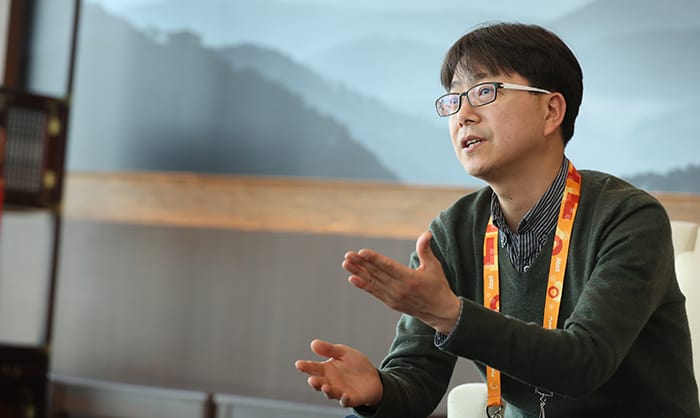
The lead researcher at the Korea Sports Promotion Foundation, Kim Kwon-Il, who is also a KBS sports broadcaster for the PyeongChang 2018 Paralympic Winter Games, talks about broadcasting and disability sports, at Korea House in Gangneung on March 15.
By Korea.net Pyeongchang Special Report Team
Photos = Kim Sunjoo
Gangneung | March 17, 2018
A lot of questions come to mind when watching the Paralympic live broadcasts.
Although the types of sports are the same as the Olympics, the rules are slightly different. There are special pieces of equipment that can’t be seen during the Olympics, and according to the degree of disability, additional points might be awarded, making it difficult to know who won the gold until the final calculations are complete.
To solve these inquiries, each broadcaster provides a duo of one sport commentator and one professional sport announcer.
Korea.net recently sat down with Kim Kwon-Il who is in charge of KBS sports broadcasting. He shared with us his experiences and knowledge about broadcasting, disability sports and the Paralympics. Kim is an expert in disability sports who works on policy improvements for disabled people in the Policy Development Office at the Korea Institute of Sport Science, part of the Korea Sports Promotion Foundation.
– How did you become a sport broadcaster for the PyeongChang 2018 Paralympic Winter Games?
Due to the nature of the Paralympics, there’s a realistic difficulty in inviting experts in all sports to be commentators. Therefore, it’s necessary to have a commentator who can relay all the events comprehensively, and at the same time explain disability sports and their policies. I think that’s the reason why I was chosen for this position.
In 2016 during the Rio Paralympics, I worked with KBS for the first time, and that experience led to these PyeongChang Paralympics.
– Do you have any specialty among the events, or favorite sport?
For me, I don’t have any major type of Paralympic sport that I’m best at announcing. I work on all types of events, among which, cross-country skiing, alpine skiing and the biathlon are aired live. As for wheelchair curling and para ice hockey, there are other professional commentators, so I only introduce the game highlights through a pre-recorded broadcast. I’ll also be in charge of the broadcast we’re preparing for the Closing Ceremony on the final day of the Paralympics.
– What’s your main focus when you comment on the Games?
The most frequently asked questions from the audience are what kind of disability do the athletes have, how the games differ from the Olympics, and how the disability factor changes the events. So I should use the professional vocabulary concerning disability, but that would just make the explanations more complicated and more difficult to understand for most people.
Therefore, I try not to use the professional vocabulary and I just explain it in the easiest way possible. Normally, I emphasize certain events in the race and try to explain why they’re noteworthy. For instance, when we watch an alpine skier in the sitting category, they come down the slope sitting on one plate, a monoski, and using the outrigger to control their direction. I’m amazed by the greatness of the human body when I see how they come down the steep slope at that speed. I always try to stress these points when doing a broadcast.
– Have there been any great broadcasting experiences here at these Paralympics?
During the snowboarding on March 12, the starting device was broken and so event was delayed for over an hour. At the time, we were live on air, and I really didn’t know what to do. Extemporaneously, I started to talk about disabled athletes, sports and policies. I also shared my thoughts about the positive changes I see in the public perception of disabled people and of the Paralympics, the boom effect of the Paralympics, special rules at Paralympics, and other stuff. It was a pity that the later part of the event couldn’t be broadcast due to time restrictions.
– As a sports broadcaster, what do you expect from the audience?
In the past, the public perception of disabled people was different from it is now. Honestly, the public used to perceive disabled as people as people who needed help, people who ought to be pitied. I think the fastest way to change this perception is through sports. Whether the person is disabled or non-disabled, the way in which we try to overcome our limits are all the same, as we are all merely human beings. I hope that people can see the Paralympics as just a normal type of sport. I’ll try my best to make the broadcasts as easy and entertaining as possible so that I can contribute to changing and improving these perceptions.
jesimin@korea.kr







![[K-brand-promoting ethnic Koreans ⑤] Spreading taekwondo ‘spirit’ in Singapore](https://gangnam.com/file/2024/02/20231129124433000_ENU3D0FB-218x150.png)















